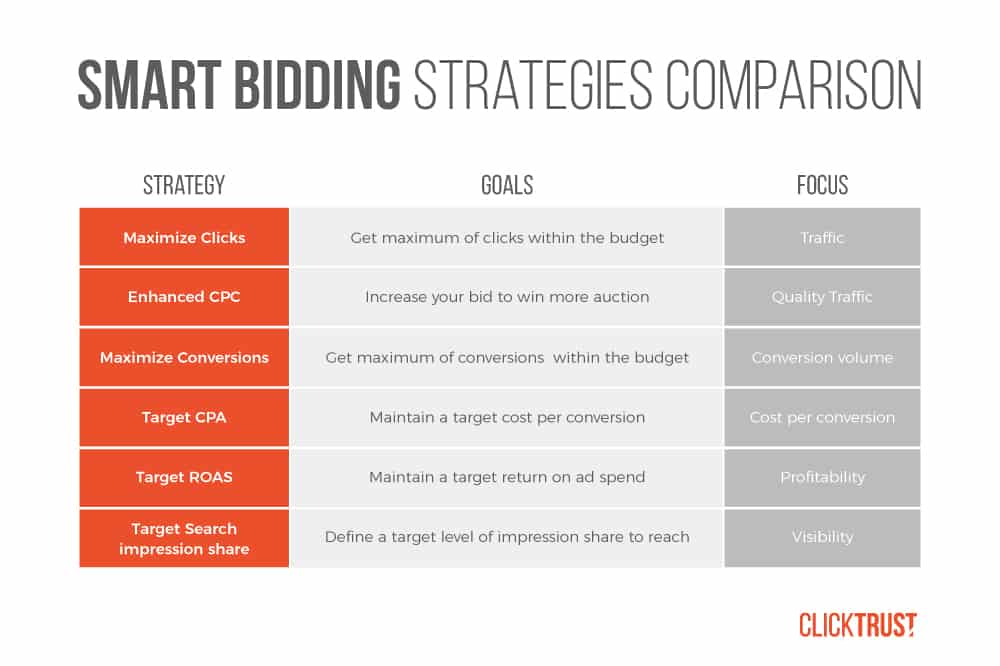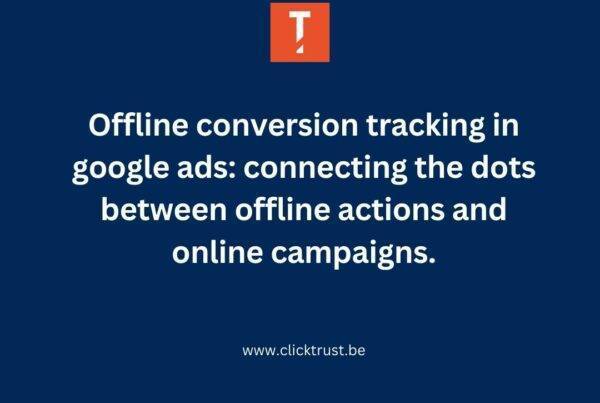We started writing an article about Smart Bidding and before we knew it we had more than 10 pages. So we decided to split our full article in 3 parts starting with an introduction to Smart Bidding. Next, we will tackle the question: How to choose the right Smart Bidding strategy? Ending this series with how to optimize campaigns that run on Smart Bidding.
The reason we write about Smart Bidding is that we keep having marketing managers and junior hires asking the same kind of questions during Clicktrust Academy training on SEA and Google ads.
“I get the idea of smart bidding, but I always wonder how/when to use one or another.”
There are plenty of resources online explaining the concept of smart bidding strategies in Google ads, but very few real-life use cases and hands-on explanations on when and how to use them properly.
It can be really frustrating and overwhelming for digital marketers.
To fill that gap, we decided to create a complete guide: “Using Smart Bidding in Google ads in 2020”.
Our focus will be “search campaigns” in this article, but the same ideas can be applied to Shopping, Youtube, and Display campaigns.
A little history of smart bidding
In the past, AdWords (before it was called Google ads) introduced Smart Bidding strategies back in 2016, building on previous automated bidding options announced in 2010 based on “Conversion optimizer” from 2007.
Before smart bidding, when manual bidding was the norm, the work of PPC campaign managers was quite different.
- A huge load of analysis in excel tables to find what was working and what was not
- Reducing bidding manually on non-performing keywords
- Adapting bidding on performing keywords to have an acceptable cost per action
- Adapting bid modifiers by device, time of day, audiences,…
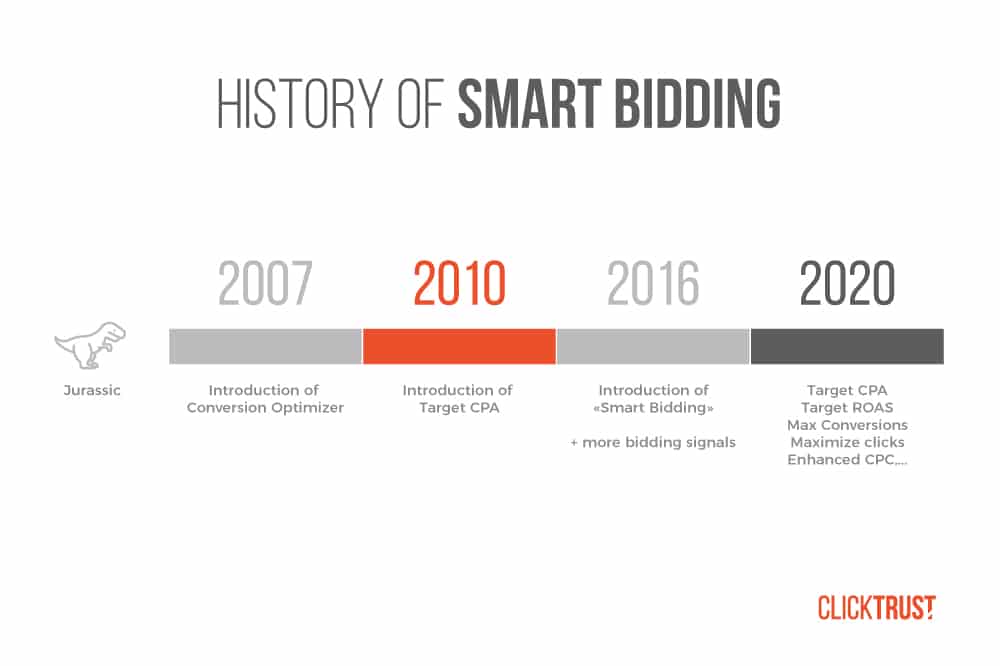
It was a lot of work and a constant hassle.
It was also the “fun period”.
If you were good and really understood the mechanism of the auction, you could really battle with the PPC managers of your competitors to try burning their budget.
PPC managers quickly started to use automated rules and scripts to streamline work and reduce the number of manual tweaks in the accounts. It was the very beginning of bidding automation.
Google then developed its “Smart Bidding Strategies” to make that bidding process more efficient, pushing things even further by adapting the bidding at every auction for every user.
Smart bidding is the fancy term for “automated” bidding strategies. In simple words, the idea is to let the Google bidding algorithm work for you by increasing/decreasing bidding in every auction, to get you the maximum amount of leads/sales at the best cost.
That’s the theory.
How does smart bidding work
As Google mentions in their help section:
“Smart Bidding is a subset of automated bid strategies that use machine learning to optimize for conversions or conversion value in each and every auction—a feature known as “auction-time bidding”.
Target CPA, Target ROAS, Maximize conversions, Maximize conversion value, and Enhanced CPC (ECPC) are all Smart Bidding strategies.”
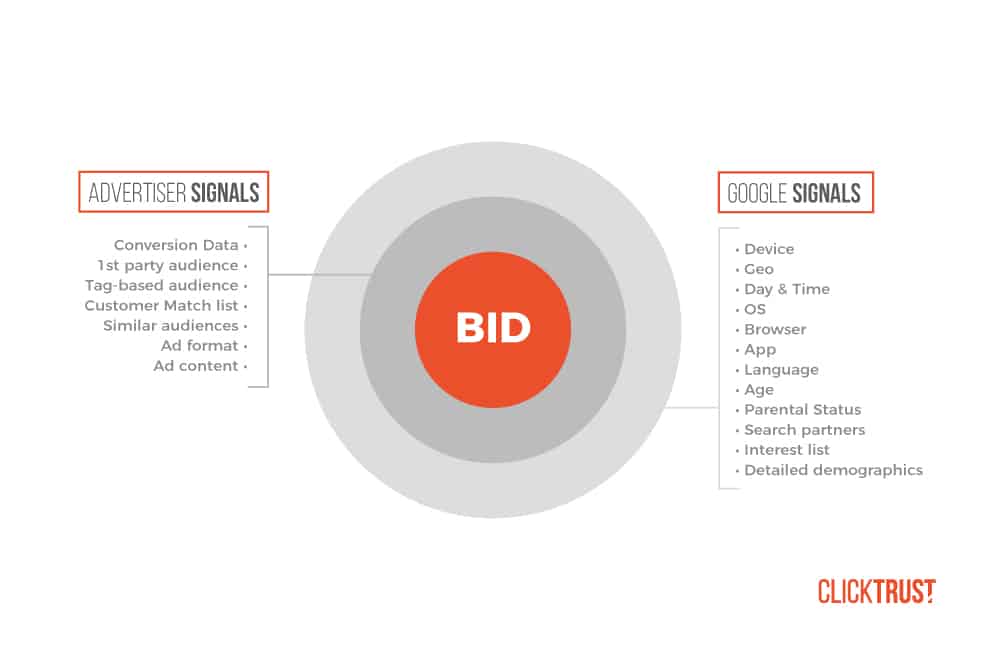
These strategies are based on 2 main principles :
- Advanced machine learning: The more data you give to the algorithm, the smarter it will become. The more conversions are tracked and fed to the algorithm, the better it will become to recognize your likely “converters” with accuracy.
- Wide range of contextual signals: The algorithm “learns” who are the users more likely to converts by analyzing their: Demographic, device, location, behavior, time of day, language, and a lot of other signals.
Machine learning will be able to adapt your bidding for each and every auction to place your ad at the right time in front of the right user. The final goal is usually to get as many conversions at the best cost.
Here is a quick recap of the different smart bidding strategies. We won’t go deep in the explanations of each and every strategy, as mentioned there are a lot of resources out there explaining every detail and aspects of each strategy.
AI vs CLICKTRUST
At CLICKTRUST, we are always skeptical of new “Shiny things” released by the ad platforms.
We decided some years ago to put Jochen aka “The Machine”, our best PPC campaign manager and senior analyst, in competition with smart bidding.
Of course, there is no such thing as a magical tool to make performance better without really seeing any proof of this.
Together with our client BNP Paribas Fortis we decided to run a big test on many different accounts and kept a score “AI vs. CLICKTRUST”.
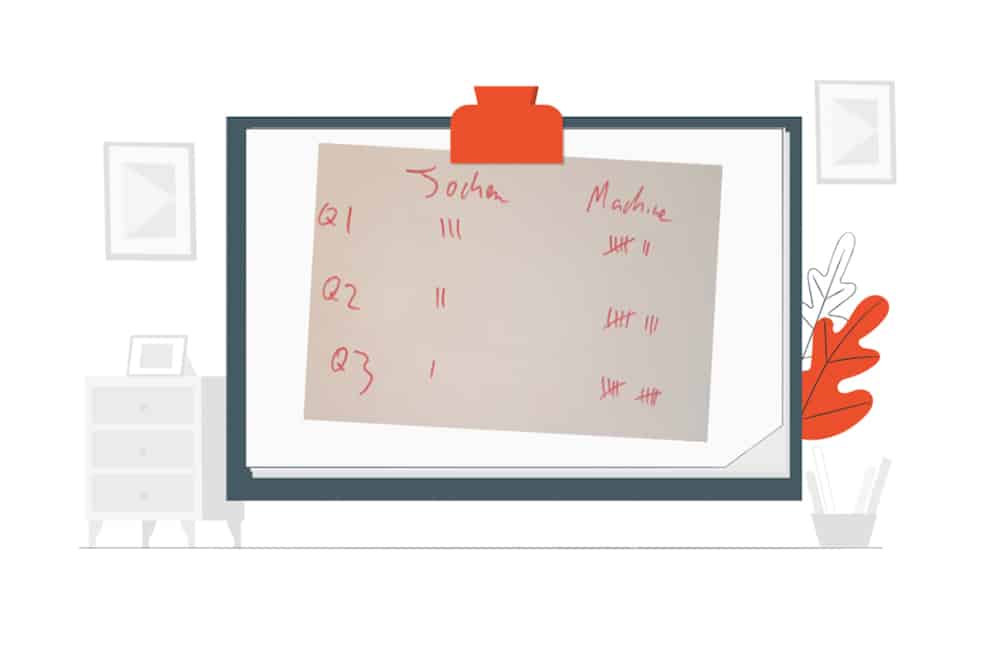
In the first weeks of the test, we scored a lot of points, but after some days the scoreboard on the AI side increased rapidly.
Proving to us that smart bidding, after a learning phase and with enough data, is indeed smarter than our best senior analysts.
One of these tests got picked by Google and they made a “Think with Google” article about it.
After this test, we successfully rolled out smart bidding on almost all of our accounts. As we gained more and more experience with the use of Smart Bidding we also discovered the impact of Smart Bidding on KPI’s like search impression share.
Our job as Analysts doesn’t stop at the implementation, we need to keep optimizing the campaigns. This is done by using the time Smart Bidding freed up to go deeper into audiences, messaging, and strategy.
Besides this, we also adapt the settings of Smart Bidding depending on the campaign’s performance.
The changes to Smart Bidding we make are usually between 15 and 20% of the current settings so that the Smart Bidding algorithm doesn’t need to go through a big learning cycle again.
We make these changes for example when the campaigns are limited by budget (decrease of Target CPA or increase of Target ROAS) or when the spend level can be increased within the targets (an increase of Target CPA or decrease of Target ROAS).
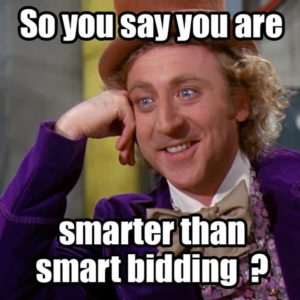
Obviously, you will still have these groups of haters bashing on smart bidding claiming they can beat them with their manual bidding “Because they know better, smart bidding sucks and Google is just taking their money”. Reality is a bit more nuanced.
In some cases manual bidding might indeed perform a bit better, but would the time saved to do other things to improve the business of the client (budget allocation optimization, cross channels strategies, website recommendations …) weigh up to the small incremental gain in performance?
Want to know how to choose the right smart bidding strategy or how to optimize campaigns that are running on Smart Bidding? Subscribe to our newsletter and get first access to Part 2 and Part 3 or our Smart Bidding guide
Get our ramblings right in your inbox
We deepdive into hot topics across digital marketing and love to share.


